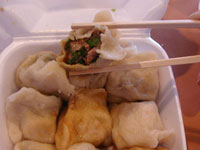China imports insecticide-tainted food in Japan
By Anastasia Tomazhenkova: China imports insecticide-tainted dumplings in Japan. A spiraling nationwide scare over food products forced supermarkets, restaurants and schools to clear Chinese food from their shelves and kitchens.

At least 10 people have fallen ill since December after eating dumplings produced by Tianyang Food Processing in China's Hebei province. But the number of victims could be as high as 500.
Investigators also found a tiny hole in a dumpling bag recovered from a sickened family, suggesting the food may have been deliberately contaminated, said Kenichi Mizuno, a police official in Hyogo prefecture, where three people were hospitalized.
Officials said the insecticide - which is not approved for use in Japan but may be in use in other countries - was found in very high concentrations.
A lab test of one of the four leftover dumplings brought in by another sickened family found concentrations of the insecticide methamidophos of 130 parts per million, up to 400 times the limit for residues of the chemical allowed on imported vegetables in Japan, said Co-Op Net, a cooperative that sold the product.
Health Ministry official Rie Hatanaka said the high concentrations suggested the insecticide was not residue from farm use, though she would not speculate on how it ended up on the dumplings.
"Obviously it came from somewhere else," she said.
The contamination, which topped Japanese news reports, prompted many stores and restaurant chains to stop using imported Chinese food altogether, reconsider safety standards and even cut back on business with China.
The dumplings have also become an issue between Japan and China.
"I'm afraid the dumplings could cause a negative impact on our diplomatic ties," said Foreign Minister Masahiko Komura. "We should promptly take measures to determine the cause and prevent a recurrence before relations are damaged."
Those sickened suffered severe abdominal pains, vomiting and diarrhea. A 5-year-old girl fell into a coma but later regained consciousness, and her mother, two brothers and a sister were in serious condition.
Supermarket operators Seiyu Ltd. and Ito-Yokado Co. quickly removed the dumplings and all other products made by Tianyang, while department store Daimaru Inc. removed all food imported from China, the companies said Friday.
Seiyu supermarket chain spokeswoman Shoko Nagata said the company had also posted notices urging customers to return any products from Tianyang.
"We also plan to review our safety standards and may consider obtaining imports from other countries," she said.
Restaurant operator Skylark Co. indefinitely suspended 20 dishes at its 4,150 outlets because they included processed food imports from China, though none was related to the dumplings or Tianyang, said company spokesman Shunichi Ito.
"Realistically, it is almost impossible to totally eliminate Chinese food imports," Ito said. "But we wanted to go ahead and remove part of our items to relieve consumer concerns."
The Education Ministry banned the use of all food from Tianyang Food in lunches at the nation's 48,525 schools.
Imports of Chinese food products have surged in recent years, providing much cheaper alternatives to notoriously expensive Japanese farm goods.
The dumpling scare - and the feverish media attention - compounded already deep suspicions among consumers in Japan and elsewhere about the safety and sanitation of Chinese foods. China's exports have come under intense scrutiny in the past year after a number of potentially deadly chemicals were found in goods including toothpaste, toys, pet food and seafood.
China's government launched a four-month campaign last August to improve the quality of Chinese products and restore international confidence in its goods. Officials termed the campaign a success.
The scare also comes as general concerns about food safety, domestic sources included, are rising in Japan. Food-related scandals are nearly a weekly occurrence.
"I was afraid this was going to happen someday," said Satomi Kitagawa, a 32-year-old housewife, outside a Tokyo supermarket. "I have been pretty careful about not choosing vegetables from China, because I have to feed my little son, but you never know what's inside processed food. It's scary."
Health Minister Yoichi Masuzoe said he was considering revising the nation's food safety law. Currently, quarantine officials randomly inspect agricultural imports, but not processed foods such as dumplings.
Subscribe to Pravda.Ru Telegram channel, Facebook, RSS!


